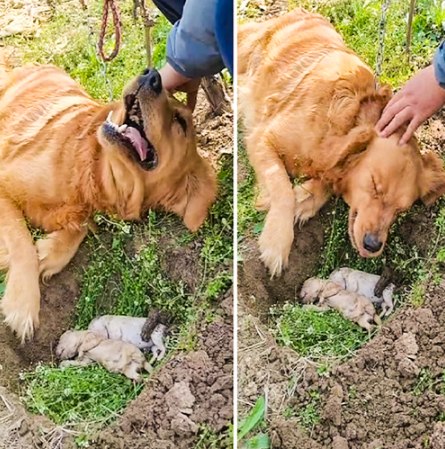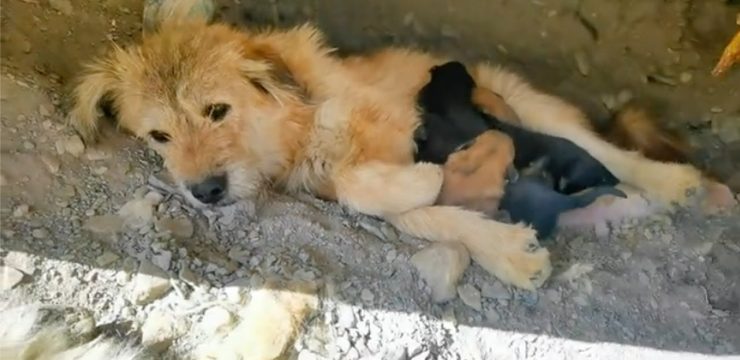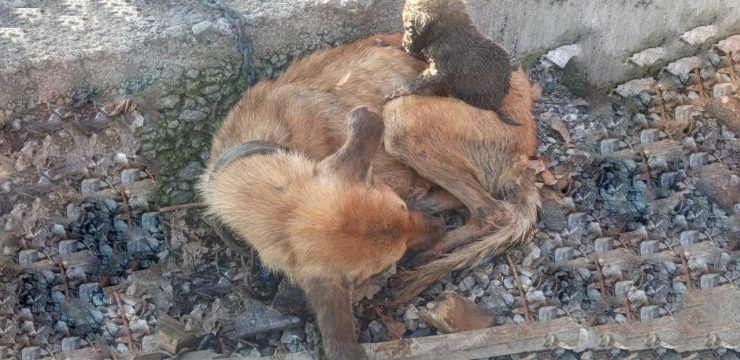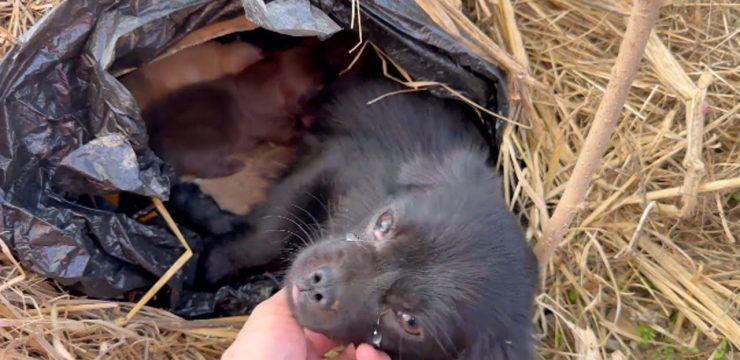In the world of animals, grief is not exclusive to humans. Just like us, animals also feel deep sorrow when they lose someone they love. This emotional pain can be particularly intense in dogs, who are known for their loyalty, attachment, and strong maternal instincts. The way dogs mourn a loss varies from one to another, but what remains consistent is their ability to feel — and to suffer — when tragedy strikes. The story of a mother dog from Suzhou, in the Anhui province of China, is a heartbreaking example of this emotional depth.

The mother dog had just given birth, but the joy of welcoming new life was quickly turned into overwhelming grief. According to the dog’s owner, a man known only as Mr. Qin, the puppies did not survive the birthing process. It was a devastating moment, not just for the owner, but especially for the mother dog. She had gone through the pain of labor, expecting to nurture and raise her babies, only to be left with unbearable emptiness. But it wasn’t just sadness that overwhelmed her — it was confusion, disbelief, and a refusal to accept that her babies were truly gone.
What happened next stunned many people. After the puppies had passed away, Mr. Qin gently buried them in a small, shallow grave near his home. He did this with the intention of offering them a peaceful resting place. But for the mother dog, it was not closure — it was the beginning of a heart-wrenching search. Relying on her strong sense of smell and maternal instinct, she found the grave and began digging at it with her paws, desperate to reach her puppies again. It wasn’t just once or twice — she tried to dig up the grave five or six times, unwilling to let go of the only connection she had left.
When she finally uncovered the small, lifeless bodies of her pups, she didn’t recoil in fear or confusion. Instead, she gently licked their tiny forms, mourning them in the only way she knew how. Witnesses described her behavior as somber and emotional — she didn’t bark or cry, but her actions spoke volumes. She lay down beside them in the mud, as if trying to stay close to them just a little longer. There was a haunting stillness to the moment, the kind of silence that can only be created by a broken heart.
Mr. Qin was deeply affected by the sight. He tried to pull her away gently, patting her head and attempting to distract her, hoping she would let go. At one point, he had to remove one of the puppies from her mouth — she had been carrying it tenderly, as if trying to protect it or wake it up. It was clear that she hadn’t accepted their passing. Even after being comforted by her owner several times, she returned again and again to the place where her puppies lay, refusing to leave their side. Her sorrow was not just visible — it was palpable.
This story touches on a truth that many pet owners understand deeply: animals, especially dogs, experience grief. And for a mother dog, losing her puppies is a trauma that can’t be easily healed. In litters with many puppies, if one dies, the mother may feel the loss but will typically move on and focus her energy on caring for the surviving pups. However, in cases where the entire litter is lost, the emotional blow is much greater. Without any puppies to care for, the mother is left with a void she doesn’t know how to fill.
In such situations, the grieving mother may show signs of depression, including refusing to eat, lying around for long periods, whimpering, or being unusually quiet. These behaviors are not mere coincidences — they are expressions of sadness, loss, and helplessness. The bond between a mother and her young is one of the strongest in nature, and its sudden severance leaves deep emotional wounds.
It’s important for pet owners to recognize these signs and respond with compassion. Just like people, dogs need time and support to heal. Comforting a grieving pet isn’t about just giving treats or toys — it’s about being present, showing affection, speaking in soothing tones, and giving them the time they need to process their loss. In Mr. Qin’s case, he stayed by his dog’s side, comforting her as best he could. There was little he could say or do to erase her pain, but his presence offered her some small measure of peace during such a difficult time.
The emotional intelligence of animals is often underestimated. Stories like this one serve as reminders that dogs, especially those who have formed deep bonds with their offspring or owners, are capable of experiencing profound emotions. When they mourn, it’s not just instinct — it’s love, heartbreak, and a need to understand why something so precious was taken away.
While this story is deeply sorrowful, it also highlights something beautiful: the unwavering love of a mother, even in the face of death. The mother dog’s refusal to abandon her puppies, even after they had passed, is a powerful testament to the strength of her maternal bond. It’s a reminder to all of us that grief is not reserved for humans — it lives in the hearts of animals, too.
For those who care for animals, these moments serve as both a warning and a guide. Losing a loved one is one of the most painful experiences in life, no matter the species. And for pet owners, understanding that their animals can grieve is crucial to providing the care and support they need during such times.
In the end, while the mother dog in Suzhou couldn’t bring her puppies back, she honored them in the only way she could — by refusing to forget them. Her sorrow, though silent, echoed far beyond that muddy grave. And for everyone who witnessed her pain, the message was clear: love, in its purest form, knows no species, and grief is a language that even animals understand.





